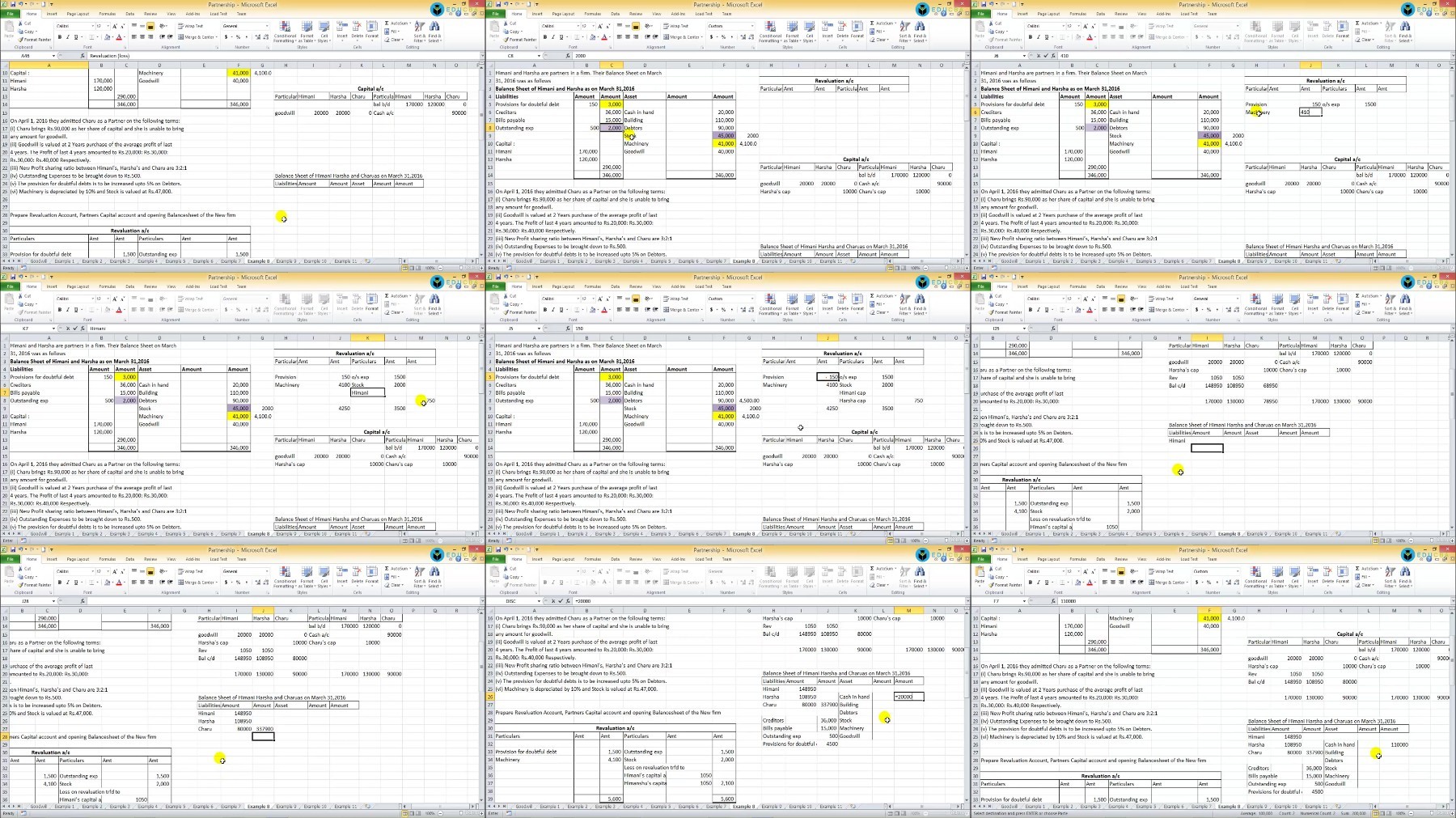Most Commented
Mastering Partnership Formation And Operation




Description material

Mastering Partnership Formation And Operation
Published 10/2024
MP4 | Video: h264, 1920x1080 | Audio: AAC, 44.1 KHz
Language: English | Size: 2.23 GB | Duration: 3h 36m
Unlock the secrets of successful partnership formation and management with our comprehensive course.
What you'll learn
Fundamental Concepts of Partnership: Understanding the definition, importance, and structure of partnerships, including legal implications and responsibilities.
Key Features of Partnerships: Exploring the characteristics that define partnerships, such as decision-making processes, profit-sharing methods, partner roles.
Types of Partnerships: Identifying and differentiating between various types of partnerships, including general, limited, and silent partnerships.
Partnership Accounting Principles: Gaining practical knowledge in maintaining partnership accounts, calculating capital balances, managing ownership changes.
Goodwill Valuation: Learning how to assess goodwill in a partnership using different methods, including the Super Profit Method and Capitalization Method.
Interest Calculations: Understanding how to calculate and manage interest on partners' capital contributions and drawings.
Revaluation of Assets and Liabilities: Learning the processes involved in revaluing assets and liabilities during changes in ownership.
Settlement Procedures: Gaining insights into the settlement of partners' claims upon retirement or dissolution, ensuring a fair and transparent process.
Practical Application: Working through real-world examples and numerical problems to apply theoretical knowledge, enhancing problem-solving skills
Collaboration and Negotiation Skills: Developing interpersonal skills necessary for effective partnership collaboration, negotiation, and conflict resolution.
Requirements
Basic Accounting Knowledge: A fundamental understanding of accounting principles is essential. Students should be familiar with basic financial statements, double-entry bookkeeping, and accounting terminology.
Familiarity with Financial Concepts: Students should have a grasp of basic financial concepts such as assets, liabilities, equity, revenue, expenses, and profitability.
Mathematical Proficiency: Basic mathematical skills, including proficiency in arithmetic and percentages, are necessary for calculations related to partnership accounts, capital balances, and goodwill assessments.
Interest in Business Management: A general interest in business management, entrepreneurship, or finance will help students appreciate the practical applications of the course content.
Description
Partnerships play a pivotal role in the business landscape, allowing individuals to pool resources, share responsibilities, and achieve common goals. This course, "Mastering Partnership Formation and Operation," provides an in-depth exploration of the essential concepts and accounting practices involved in forming and operating partnerships. Through a blend of theoretical knowledge and practical examples, students will develop a robust understanding of partnership dynamics, the implications of ownership changes, and the crucial financial aspects of managing partnership accounts. Whether you are a student, a finance professional, or a business owner, this course is tailored to enhance your expertise in partnership management.Section 1: IntroductionIn this section, we begin with an Introduction to Partnership Formation and Operation. Students will gain an overview of what constitutes a partnership, the significance of partnerships in business, and the fundamental principles governing their formation and operation. Understanding these basics is crucial for anyone looking to navigate the complexities of partnership accounting effectively.Section 2: Getting Started PartnershipThe course progresses into Getting Started with Partnerships, where we delve into the Concept of Partnership. This lecture lays the groundwork by defining partnerships, explaining their legal structure, and highlighting their advantages and disadvantages. Students will also explore the Key Features of Partnership, including the roles of partners, decision-making processes, and profit-sharing mechanisms, which are vital for anyone looking to establish a successful partnership.Section 3: Types of PartnershipNext, we explore Types of Partnership, providing insights into various partnership structures such as general, limited, and silent partnerships. Understanding the differences is essential for selecting the right type of partnership that aligns with business goals. The lectures will cover Partnership Accounting principles, including how to maintain capital accounts, calculate the Capital Balance Ratio, and manage changes in ownership. Topics such as Sacrificing Ratio, Admission in Ownership, and the calculations for Interest on Capital and Drawings will be explained in detail, equipping students with practical skills for real-world applications. The section also addresses Goodwill and its treatment in partnerships, highlighting the Super Profit Method and Capitalization Method for goodwill valuation. Practical examples will reinforce learning, ensuring that students understand how to apply these concepts effectively.Section 4: ConclusionThe course concludes with a wrap-up of all the essential concepts learned throughout the sessions. The Conclusion section will emphasize the importance of a sound understanding of partnership formation and operation, as well as the skills needed to navigate the complexities of partnership accounting. Students will reflect on their learning journey and be encouraged to apply their newfound knowledge in practical scenarios, enhancing their confidence in managing partnerships effectively.By the end of this course, participants will be equipped with the critical knowledge and skills required to navigate the intricacies of partnership formation and operation. Whether aspiring to start a partnership or enhance existing partnership operations, students will emerge with a solid foundation in partnership accounting principles and practices. Enroll now to unlock the potential of effective partnership management and ensure your business thrives!
Overview
Section 1: Introduction
Lecture 1 Introduction to Partnership Formation and Operation
Section 2: Getting Started Partnership
Lecture 2 Concept of Partnership
Lecture 3 Key Features of Partnership
Section 3: Types of Partnership
Lecture 4 Types of Partnership
Lecture 5 Partnership Accounting
Lecture 6 Capital Balance Ratio
Lecture 7 Change in Ownership
Lecture 8 Sacrificing Ratio
Lecture 9 Admission in Ownership
Lecture 10 Interest on Capital
Lecture 11 Interest on Drawings
Lecture 12 Goodwill
Lecture 13 Super Profit Method
Lecture 14 Capitalization Method
Lecture 15 Treatment of Goodwill
Lecture 16 Working on Example
Lecture 17 New Partner doesn't Share Good Cash
Lecture 18 Revaluation of Asset and Liabilities
Lecture 19 Adjustment Reserve and Accumulated P and L
Lecture 20 Working on Example 6
Lecture 21 Working on Example 6 Continues
Lecture 22 Working on Example 7
Lecture 23 Revaluation Account
Lecture 24 Working on BL of Himani and Harsha
Lecture 25 Working on Balance sheet Continues
Lecture 26 Adjustment of Partners Capital
Lecture 27 Understand Revaluation Account
Lecture 28 Calculating New Profit Ratio
Section 4: Conclusion
Lecture 29 Conclusion
Aspiring Entrepreneurs: Individuals looking to start their own business ventures and seeking a solid understanding of partnership dynamics and operations.,Business Students: Students pursuing degrees in business, finance, or accounting who want to deepen their knowledge of partnership structures and the associated financial implications.,Accounting Professionals: Accountants and financial professionals aiming to enhance their expertise in partnership accounting, capital structures, and profit-sharing arrangements.,Business Owners: Existing business owners considering the formation of partnerships or looking to refine their understanding of managing partnerships effectively.,Corporate Managers: Managers who wish to comprehend partnership agreements, their financial impacts, and how they relate to overall business operations.,Individuals Transitioning to a Business Career: Those looking to transition from other fields into business roles where an understanding of partnership operations is beneficial.

Fikper
https://fikper.com/musvGzt95e/Mastering.Partnership.Formation.and.Operation.part1.rar.html
https://fikper.com/AofpXgRYd0/Mastering.Partnership.Formation.and.Operation.part2.rar.html
FileAxa
https://fileaxa.com/fgwf57w5h3wk/Mastering.Partnership.Formation.and.Operation.part1.rar
https://fileaxa.com/22cg0xi8j9ik/Mastering.Partnership.Formation.and.Operation.part2.rar
RapidGator
https://rapidgator.net/file/fe04e6d12172e94f752a824186b1b706/Mastering.Partnership.Formation.and.Operation.part1.rar
https://rapidgator.net/file/8eaa67f0de3d764b0c931cbdc146a8cd/Mastering.Partnership.Formation.and.Operation.part2.rar
FileStore
TurboBit
https://turbobit.net/l7i2ec686fvb/Mastering.Partnership.Formation.and.Operation.part1.rar.html
https://turbobit.net/0wg1lljdfmev/Mastering.Partnership.Formation.and.Operation.part2.rar.html
Join to our telegram Group
Information
Users of Guests are not allowed to comment this publication.
Users of Guests are not allowed to comment this publication.
Choose Site Language
Recommended news
Commented



![eM Client Pro 9.2.1735 Multilingual [Updated]](https://pikky.net/medium/wXgc.png)





![Movavi Video Editor 24.0.2.0 Multilingual [ Updated]](https://pikky.net/medium/qhrc.png)

